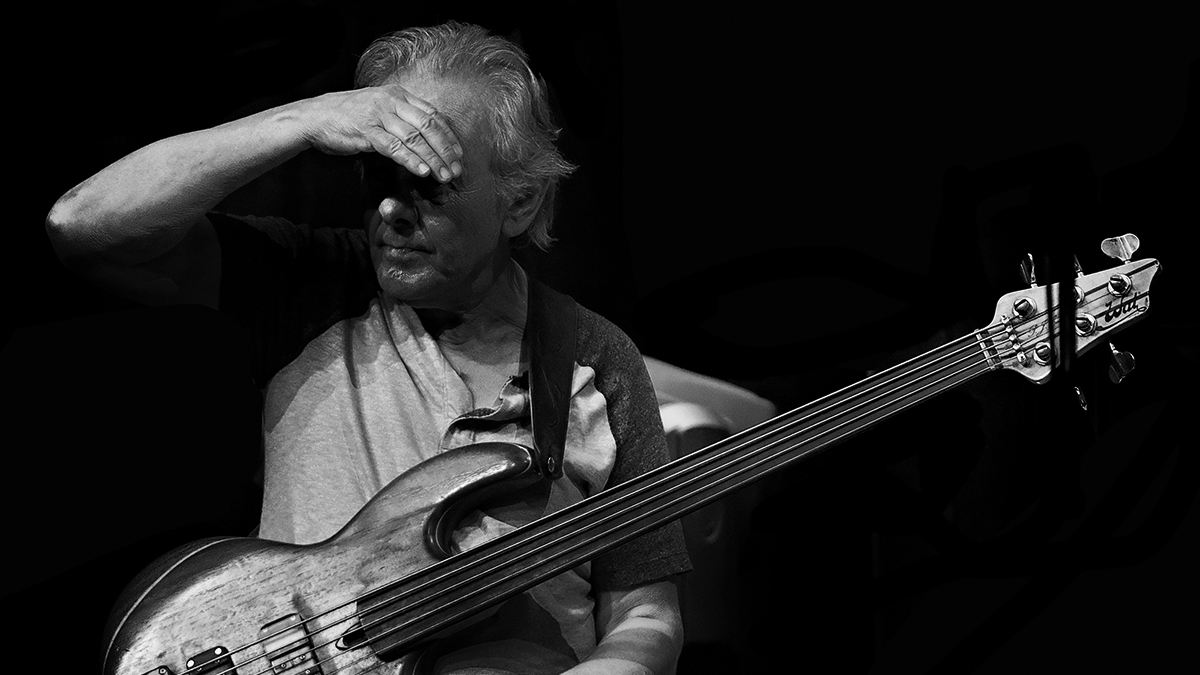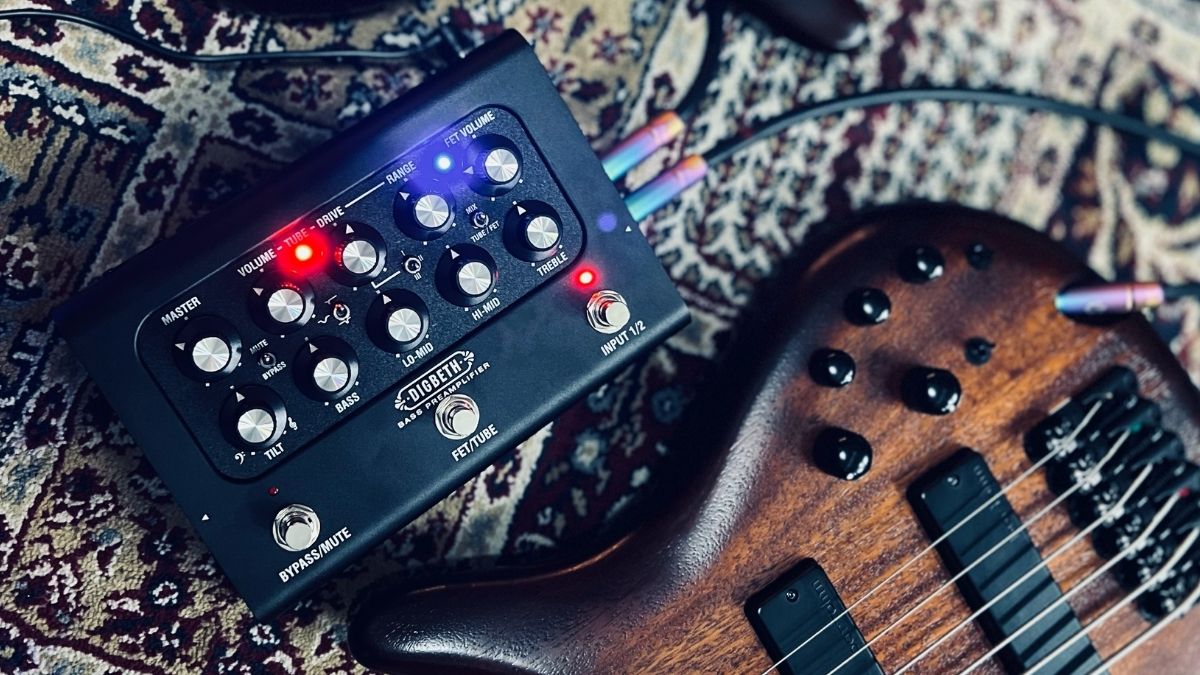Percy Jones: “I related to fretless right away, and I could express myself in a way that I couldn’t do on a fretted bass”
The former Brand X bassist discusses his loyalty for fretless five-strings and the socially distanced recording sessions with Alex Skolnick that lead to his new band and album, PAKT

There are supergroups, and then there is PAKT, named after fretless bass guitar player Percy Jones, guitarists Alex Skolnick and Tim Motzer, and drummer Kenny Grohowski.
It’s a unique line-up, and fortunately their new, self-titled album lives up to the hype. Jones, a long-time member of fusion band Brand X – famously, once the home of drummer Phil Collins – until his departure in 2020, is on stunning form. As a reminder of why he’s been in demand with Suzanne Vega, Brian Eno, and many other musicians over the years, the new album serves an important purpose.
We asked him about the genesis – no pun intended – of the two-hour improvised recording session, the history behind his allegiance to fretless five-strings and why he feels "liberated" after leaving Brand X.
How has the pandemic treated you, Percy?
“I was in the same boat as almost everybody else: tours and gigs were cancelled or postponed, with nobody really knowing when or if everything would ever return to normal. It was actually the perfect time to sit down and do some writing, which is what I did.
“I had been somewhat overdue for some new stuff, so it felt good to get a few new tunes worked out and finished. I also did a bit of recording here at home: a track for Richard Barbieri and four tracks for Mark Wingfield. I also kept practicing to stay in shape. It was a good opportunity to work on the weaker aspects of my technique.”
It sounds like it. At least the PAKT album is tremendous. We’re really enjoying it.
All the latest guitar news, interviews, lessons, reviews, deals and more, direct to your inbox!
“Oh, good. Thank you. That was recorded last August – actually, on my wife’s birthday. I’d played with Kenny [Grohowski] in Brand X, so we had a musical rapport going on, but I’d never played with Alex [Skolnick] and Tim [Motzer] before. At the time, I didn’t know if it was all going to shake out. But yeah, it went pretty well.”
Is not having played with people before beneficial, because they’re a blank page, as it were?
“That’s a good question. I don’t know the answer to that. Maybe the music wouldn’t have turned out as interesting. We were responding to improv, so nobody knew what was coming next. Those guys are good listeners, though, which makes a huge difference. Nobody was afraid to stop playing – to just shut up and let another guy speak, musically, for a few minutes.”
Was it all completely improvised?
"Well, we did a soundcheck and played for about half an hour before they started recording and streaming. By the end of the soundcheck, it was already starting to shape up. In fact, I lost track of what was going on – I thought, ‘Maybe they’re recording it now,' but they hadn’t actually started it. It was a nice evening. Sometimes, projects like this can go really badly.”
There’s always an element of risk, presumably.
“Oh, yeah. I mean, I’ve done similar gigs, and it’s been a car crash. It doesn’t always go well. You have to have the ability to improvise, and not everybody can do that. You also have to be a good listener – you have to really pay attention to what the other guys are doing.
“As a bass player, historically, I’ve always tried to support the other guys in the band that I’m in. If there’s a guy soloing, I’ll try and support him. I’ll try and lock in with what the drummer is doing and help it all to make sense. If you’ve done it long enough, it becomes second nature – but stuff can still go wrong.”
Which bass guitar were you were using to record?
“I’ve been using an Ibanez five-string for the past few years. It’s interesting – there’s no magnetic pickup on it, which takes a bit of getting used to because it’s very dynamic, and very sensitive to how hard you pull. It's like an upright in that respect.
“You have to be careful with the EQ, because the piezo pickup is sensitive to the acceleration of the string rather than the velocity, and the output tends to go up with the frequency. You have to be careful that you don’t have too much high mid or high end, because then you start sounding like you’re typing – but if you get it right, it’s a pretty nice sound, I think.”
You also play a Wal.
“Yes, although I’ve used the Ibanez pretty much 100 percent of the time for the last 10 years. Just recently, when I started doing the PAKT stuff, I switched back to the Wal. I just like to try different approaches and develop new ideas.
“I try not to stay with a static approach to everything. I also have a Wal four-string here, which I haven’t actually played for years and years, because when I switched to the five-string bass, I didn’t go back afterwards.”
You’ve said before that you wouldn’t want to play a six-string bass.
“Well, you know, I have enough trouble with five. I wouldn’t be able to handle six. The reason for going to a five was that I wanted to go lower.
“I have no desire to get higher in pitch. I can use harmonics to get the really high stuff going. I’m not against six-string basses – Anthony Jackson is fantastic – but for me, personally, five-string is the best way to go.”
You made a permanent switch to fretless bass in 1974. Who else was playing fretless back then?
“I can’t think of anybody that I knew, personally, who was playing a fretless. It was a bit of a rarity back then. Even though I always played electric bass, and I started on a fretted bass, I mostly listened to upright players for inspiration. The biggest one was probably Charles Mingus. There were a few that I looked up to and listened to, but he was my favorite.”
What was your first fretless bass?
“Brand X was just getting going, and I got my first publishing advance, which was the sum of £200. I remember reading the Melody Maker that week, and in the back there was a guy who was selling a Fender Precision fretless for £200. I went up to North London to his house and took a look at it, and it was in really good nick, apart from some Guinness beer stains on it. I gave him the money and took the bass home, not knowing if I’d be able to master it or not.”
How long did it take to feel comfortable with the fretless bass?
“Almost right away, although I wouldn’t say it was comfortable, because my intonation needed work, and I needed to master a little bit of technique. But I related to it right away, and I could express myself in a way that I couldn’t do on a fretted.
“At the time, we were only six weeks from recording our first studio album Unorthodox Behaviour in 1975, although the album didn’t come out until 1976, so I made a real determination to try and nail the bass well enough to play it on the record, which I did. I still had some intonation issues going on, but it wasn’t too bad. I never went back to playing fretted bass after that point.”
You do a lot of three-finger picking. Was that your innovation?
“Possibly, yes. I started out very intuitively, playing an arpeggiated chord with three fingers as if it was a major or minor triad, or I-VII-III. I wasn’t even thinking about it in detail – I would intuitively do it – but then one day, I thought I’d better sit down and figure out exactly what I was doing and try and get a handle on it.
“I analyzed what I was doing with my plucking hand, and my logic was that my second finger is the longest finger, so I would try and use that when going up the fingerboard, because it obviously had the extra reach, which was useful. I came up with all these different fingerings.
“Say there were two notes on the A string, and the next note was up on the D string, I’d go 1, 3, 2, and descending, I’d do that with two fingers, just alternating. For me, it just makes playing easier.”
You left Brand X last year after 46 years in the band. What happened there?
“I didn’t actually leave the band: I stopped working with their management at the end of 2019. I simply refuse to work with anybody who is not transparent and accountable. I still consider myself an owner of Brand X, along with [the band’s guitarist] John Goodsall.”
So PAKT is your main current live and studio project?
“Yes, at the moment it is. We recorded the album in the middle of the pandemic, masked up and socially distanced, with no audience. That made it all a bit weird and unusual, but as I said, it all worked out rather well. We recently did a few gigs that went well too. I still have my other band, MJ12, which I enjoy a lot. That’s been inactive during the pandemic, but we have gigs to play in October, so I’m really looking forward to playing with those guys again.”
Playing with new people is always an introduction to new ideas along with new challenges, so the learning process continues
Would you say that you feel optimistic about the future?
“Yes, I am. I moved on from Brand X and into trying out new ideas with new people, and I actually feel quite liberated. Playing with new people is always an introduction to new ideas along with new challenges, so the learning process continues. I have to say thanks to all the people who listened to and supported Brand X over the decades, and hope they like PAKT’s new music, as well as the music to come.”
- PAKT is out now via Moonjune Records.
Bass Player is the world’s most comprehensive, trusted and insightful bass publication for passionate bassists and active musicians of all ages. Whatever your ability, BP has the interviews, reviews and lessons that will make you a better bass player. We go behind the scenes with bass manufacturers, ask a stellar crew of bass players for their advice, and bring you insights into pretty much every style of bass playing that exists, from reggae to jazz to metal and beyond. The gear we review ranges from the affordable to the upmarket and we maximise the opportunity to evolve our playing with the best teachers on the planet.

